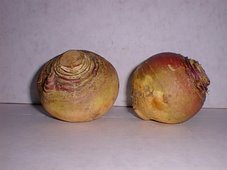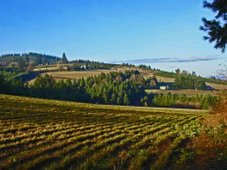
On January 25th the Celtic tribes of Scotland celebrate Burns Night by gathering for the Burns Supper, all in honor of the 248th anniversary of the birth of the great Scottish poet Robert Burns (1759–1796). Burns distinguished himself not only by the quality of his work, but also by his willingness to write in the Scottish dialect. He preserved and disseminated a number of ancient Scottish and Celtic songs, including Auld Lang Syne, and played a major role in the preservation and expansion of that ancient culture.
The traditional Burns Supper consists of haggas, the Scottish national dish, and "bashed neeps" (mashed rutabagas) combined with a copious flow of whiskey and recitals of the master's poetry. The Selkirk Poem is the centerpiece of the readings, and especially these lines:
"Some hae meat and cannot eat.The recipe for mashed rutabagas is, of course, wildly popular and requires no elaboration (see below). Neeps have deep roots (no pun intended) in the Burns Supper tradition:
Some cannot eat that want it:
But we hae meat and we can eat,
Sae let the Lord be thankit."
"NEEPS - or turnips, swedes or rutabaga, depending on where you are when you read this - is one of the traditional accompaniments to haggis on Burns Night.As for haggis:"The neeps are normally served mashed - but on their own, not mashed in with the tatties. While most folk will simply mash the neeps unadorned, some will add butter or even some herbs.
"The story goes that neeps - or Brassica rapa - were introduced to Scotland by Patrick Miller, an entrepreneur and director of the Bank of Scotland, and the man who brought the threshing mill and drill plough to Scotland...
"King Gustav of Sweden supposedly sent the neep seeds to Miller: hence turnips are called "swedes" south of the Border." [The Scotsman, 1/25/07]
"A haggis is actually a large spherical sausage made of the liver, heart, and lungs of a sheep, all chopped and mixed with beef or mutton suet and oatmeal and seasoned with onion, cayenne pepper, and other spices. The mixture is packed into a sheep's stomach and boiled. Haggis is usually accompanied by turnips [sic.] and mashed potatoes; Scotch whisky is customarily drunk with it.." [Note the familiar confusion of "turnips" and "rutabagas."]No doubt the willingness of Scots to eat haggis is directly proportionate to their consumption of the "Scotch whisky that is customarily drunk with it." For whatever reason, haggis producers are reporting record sales, which we fervently hope will have a coattail effect on the worldwide market for rutabagas.
GRAPHIC: Buitensport-Schotland.nl





No comments:
Post a Comment